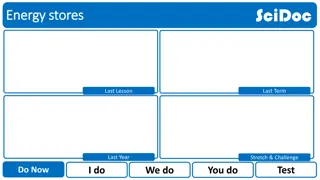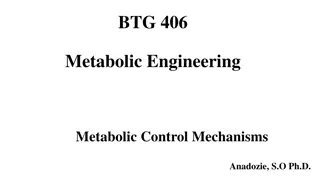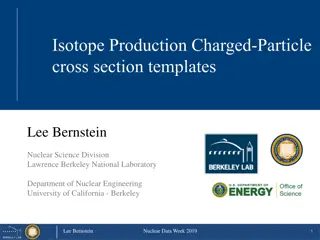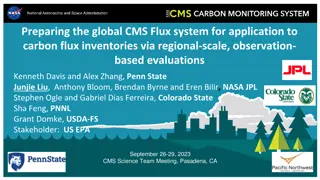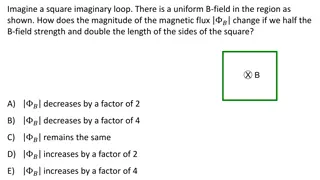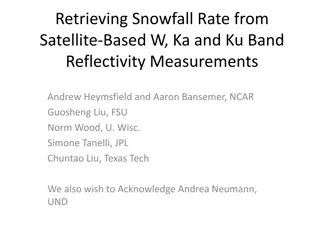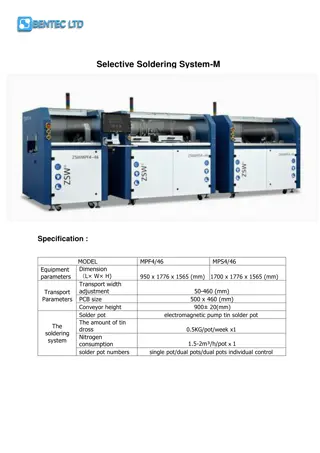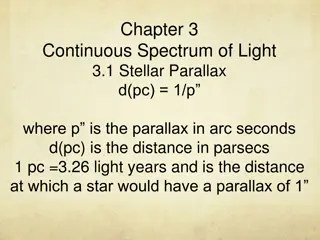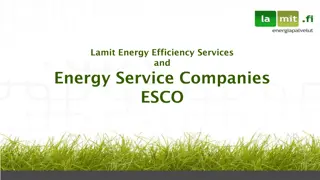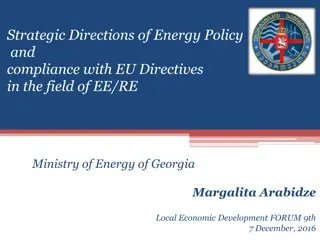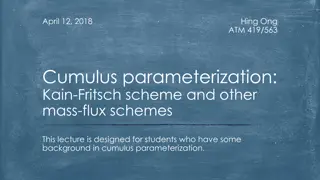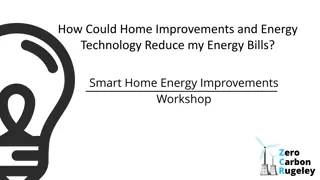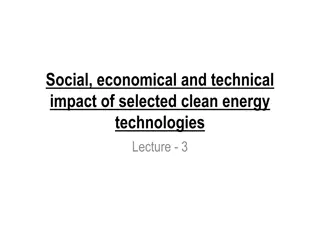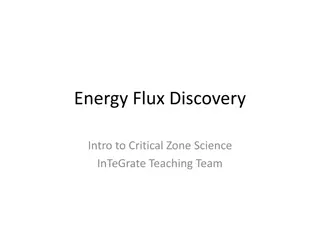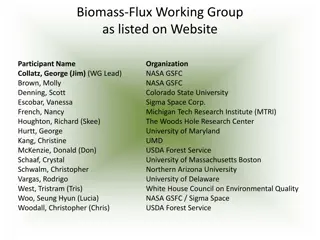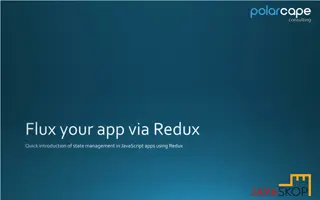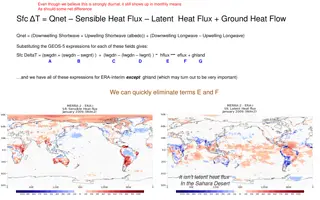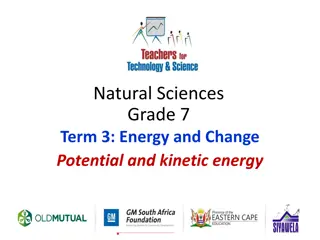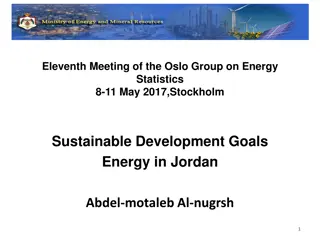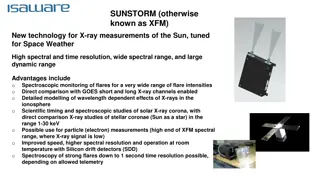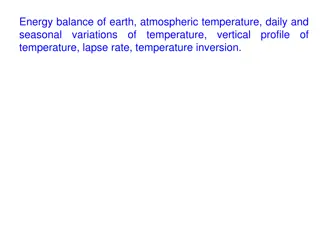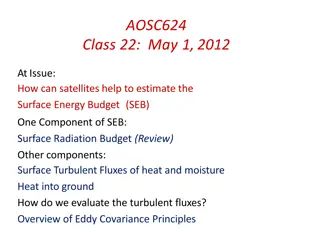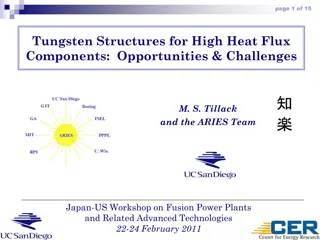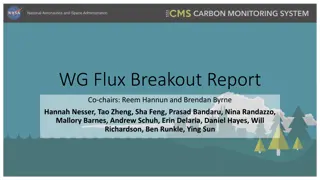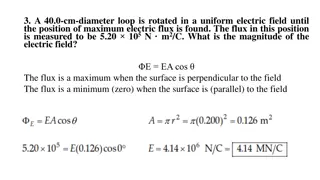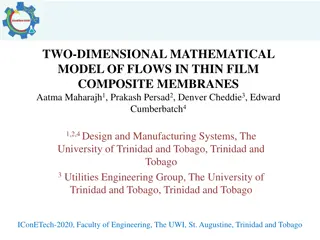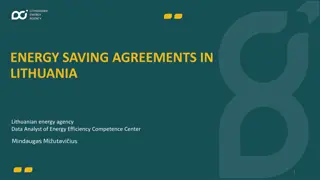Green Energy Market
Green energy also referred to as clean energy, is usually derived from natural sources that are constantly replenished. Solar energy, wind energy, hydroelectric power, biomass energy, geothermal energy, tidal energy, and wave energy are different types of renewable energy. Solar energy is the radian
6 views • 6 slides
Comprehensive Overview of Energy Balances in Germany
This material covers various aspects of energy balances in Germany, including components of energy flowcharts, renewable energy sources in the German energy balance, and total final consumption of road transport energy. It provides a detailed analysis of energy imports, domestic extraction, losses,
2 views • 10 slides
Understanding AGN Jet Production Efficiency: Insights from Spin and Magnetic Flux
A fundamental question in astrophysics is how efficiently active galactic nuclei (AGN) produce jets. Black hole spin and magnetic flux play crucial roles in determining the jet production efficiency. High-spin values and large magnetic flux threading are essential for generating high-efficiency jets
2 views • 22 slides
Understanding Energy: Types, Potential, and Kinetic
Dive into the world of energy with a comprehensive guide covering the definition, types, and characteristics of gravitational, potential, and kinetic energy. Explore how energy is the driving force behind all work and movement, with examples and explanations provided for each energy type. Gain insig
2 views • 24 slides
Sustainable Energy Initiatives at Local Level in Lithuania
The National Parliamentary Workshop on Energy Efficiency highlighted the importance of renewable energy development and sustainability at the local level in Lithuania. Initiatives such as the Breakthrough package and Renewable Energy Communities aim to improve energy efficiency, reduce energy povert
2 views • 12 slides
Exploring Energy Stores and Transfers in Science Lessons
Dive into the fascinating world of energy stores and transfers through engaging science lessons. Recall different energy stores, common energy transfers, and create flow diagrams to illustrate energy transfers in various scenarios. Explore gravitational, elastic, magnetic, electrostatic potential en
5 views • 9 slides
Energy Assistance Workshop Series Statewide Assessment
The Energy Assistance Workshop Series conducted a statewide assessment to understand energy burden and discuss utility energy assistance programs. The goal was to evaluate the effectiveness of mechanisms for energy assistance to prioritize households with higher energy burdens. The workshops aimed t
0 views • 26 slides
Understanding Metabolic Control Mechanisms in Cellular Regulation
Metabolic control mechanisms play a crucial role in maintaining homeostasis within cells by regulating metabolic pathways. This involves finely adjusting the output of pathways in response to external signals, ensuring the proper flux of metabolites to meet cellular needs. Pacemaker enzymes, such as
1 views • 17 slides
Understanding Energy Transformation in the Natural World
Energy transformation occurs continuously in various forms around us, following the Law of Conservation of Energy. From thermal to chemical and electromagnetic energy, different types of energy are converted and utilized in everyday processes. Examples include the conversion of thermal energy to ele
0 views • 27 slides
Understanding Energy - Forms, Calculations, and Applications
Explore the concept of energy through various images, including forms of energy, kinetic versus potential energy, and calculations involving kinetic and potential energy. Learn about identifying energy states, calculating kinetic energy, and solving physics problems related to energy transfer. Dive
0 views • 27 slides
Understanding Energy Transfers with Sankey Diagrams
Sankey diagrams are visual tools that depict energy transfers within a system, offering insights into efficiency and energy distribution. By examining the width of arrows representing energy flow, one can analyze useful and wasted energy outputs. Inefficient systems show a disproportionate amount of
1 views • 9 slides
Isotope Production Charged Particle Cross Section Techniques
The process of measuring angle-integrated charged-particle cross sections using the stacked target technique is discussed. The method involves the use of monitor foils, degraders, and a beam foil of interest to determine energy and flux. Uncertainties in the measurements and the correction for flux
1 views • 3 slides
Application of CMS-Flux System for Carbon Flux Inventories Evaluation
Preparation for the global CMS Flux system integration with US forest and agricultural carbon inventory data to quantify uncertainties and enhance inventory-relevant flux estimates. The project aims to evaluate the utility of CMS-Flux-NA system for top-down assessment of US agricultural and forest C
2 views • 21 slides
Understanding Magnetic Flux and Induced Current in Loops
Explore concepts related to magnetic flux and induced current in loops through visual scenarios involving uniform magnetic fields, loop movements, and changes in magnetic flux. Test your understanding with multiple-choice questions on induced EMF, loop bending, and maximizing magnetic flux. Enhance
1 views • 54 slides
Conducting an Effective School Energy Audit
Performing an energy audit at a school helps in understanding energy usage patterns, identifying areas of waste, and creating energy-saving action plans. The audit involves collecting data, creating switch-off lists, and filling out templates methodically to track energy consumption. It should be do
0 views • 16 slides
Retrieving Snowfall Rate from Satellite-Based W, Ka, and Ku Band Reflectivity Measurements
This study discusses methods for retrieving snowfall rate from satellite-based reflectivity measurements, specifically focusing on developing S-Z relationships through collocations and conservation of mass flux. It highlights the importance of identifying differences between retrieval products and t
0 views • 13 slides
Advanced Selective Soldering System with Flux Spray and Preheating Modules
The Selective Soldering System-M offers precise soldering capabilities with features like individual pot control, flux spray module for reduced contamination, and preheating module for lead-free and multi-layer boards. It minimizes flux consumption and ionic contamination while ensuring high positio
0 views • 6 slides
Understanding Different Forms of Energy and Work in Physics
Energy in physics is the capacity to do work, and there are various forms of energy such as radiant energy, kinetic energy, gravitational potential energy, elastic potential energy, chemical potential energy, nuclear potential energy, electrical potential energy, thermal energy, and sound energy. Ea
0 views • 47 slides
Understanding Stellar Properties: Distance, Brightness, and Flux
Explore the fascinating realm of stellar astronomy with topics such as stellar parallax, magnitude scales, luminosity, radiant flux, and the inverse square law. Learn about measuring distances to stars, comparing their brightness, and understanding the energy they emit into space. Dive into the intr
0 views • 31 slides
Understanding Energy Service Companies (ESCOs) and Their Role in Energy Efficiency
Energy Service Companies (ESCOs) like Lamit offer a range of energy services, from implementing energy-efficiency projects to renewable energy solutions. These companies work as long-term energy management partners, focusing on understanding customer needs, providing energy-saving solutions, and gua
2 views • 18 slides
Overview of Energy Policy and Compliance with EU Directives in Georgia
Ministry of Energy in Georgia focuses on strategic directions for energy policy in alignment with EU directives. The Energy Strategy, Covenant of Mayors, and National Energy Efficiency Action Plan are key initiatives promoting energy efficiency and renewable energy. Projects include consultancy on s
0 views • 10 slides
Understanding Cumulus Parameterization and Mass-Flux Schemes in Atmospheric Science
Explore the significance of mass-flux schemes in cumulus parameterization, their interaction with grid-scale microphysics, and the key elements and assumptions involved. Learn about the objectives, components, and limitations of classical cumulus schemes for atmospheric modeling. Gain insights into
0 views • 23 slides
Exploring Home Energy Improvements and Smart Technology for Energy Efficiency
Discover how home improvements and energy technology can significantly reduce energy bills. Join the Smart Home Energy Improvements Workshop in Zero Carbon Rugeley to explore approaches for sustainable energy production and usage at home. Learn about retrofitting, smart energy systems, and meet char
0 views • 20 slides
Social, Economical, and Technical Impact of Clean Energy Technologies
This course covers the management of micro-level clean energy projects, emphasizing the social, economic, and technical impacts of selected clean energy technologies. It discusses project organization, tools, project life cycle, financial analysis, barriers, capacity building, and more. It delves in
0 views • 32 slides
Exploring Energy Flux in Critical Zone Science
Dive into the world of energy flux discovery in the critical zone science, understanding common water and energy fluxes, cloud formations, and tracking monthly Ameriflux energy fluxes in various forest environments. Engage with visual representations and data models to grasp the intricate balance of
0 views • 5 slides
Biomass-Flux Working Group Overview
The Biomass-Flux Working Group, a collaboration involving various organizations like NASA and universities, aims to integrate land-atmosphere carbon fluxes and biomass changes to enhance estimations and understanding. By identifying overlapping projects, encouraging cross-comparisons, and reconcilin
0 views • 10 slides
Understanding Magnetic Flux and Induction Principles
Exploring the concepts of magnetic flux and electromagnetic induction through visual aids and explanations. Topics include the generation of current in coils, Faraday's law, Lentz's law, and the behavior of induced current with changing flux.
0 views • 36 slides
Introduction to State Management with Flux and Redux in JavaScript Apps
Explore the concepts of Flux and Redux for efficient state management in JavaScript applications, understanding their architecture, key components, and benefits in simplifying data flow. Dive into the unidirectional data flow pattern of Flux and the inspired improvements in Redux, alongside the comp
0 views • 13 slides
Analysis of Surface Temperature and Heat Flux Relationships
Exploring the interplay between surface temperature, sensible heat flux, latent heat flux, and ground heat flow, utilizing data from GEOS-5 and ERA-interim models to understand the impact of different heat flux components on surface temperature variations in diurnal cycles and monthly means. Compari
0 views • 8 slides
Understanding Energy: Potential and Kinetic Forms in Grade 7 Natural Sciences
Energy in various forms is explored in Grade 7 Natural Sciences, with a focus on potential and kinetic energy. Energy is the ability to do work and exists in different types like heat, chemical, electromagnetic, nuclear, and mechanical. The sun serves as a primary energy source. Potential energy is
0 views • 11 slides
Energy Strategy and Challenges in Jordan: Towards Sustainable Development
The Eleventh Meeting of the Oslo Group on Energy Statistics discussed the energy sector in Jordan, highlighting challenges such as population growth, energy demand, and high energy costs. Jordan aims to diversify energy resources, reduce oil dependency, and enhance environmental protection through i
0 views • 34 slides
SUNSTORM: Advanced X-ray Technology for Solar Measurements
SUNSTORM, also known as XFM, is a cutting-edge technology designed specifically for measuring X-rays from the Sun, tailored for Space Weather monitoring. It offers high spectral and time resolution, a wide spectral range, and a large dynamic range, making it ideal for various scientific studies rela
0 views • 4 slides
Understanding Earth's Energy Balance and Temperature Variations
Earth's energy balance is crucial for maintaining atmospheric temperature and regulating daily and seasonal temperature changes. The net radiation, consisting of incoming shortwave and outgoing longwave radiation, plays a key role in this balance. Components such as sensible heat flux, latent heat o
0 views • 18 slides
Satellite Applications in Estimating Earth's Surface Energy Budget
Satellites play a crucial role in estimating the Surface Energy Budget (SEB) by providing data on various components such as Surface Radiation Budget and Surface Turbulent Fluxes. The SEB includes factors like net radiation flux, sensible and latent heat fluxes, and subsurface heat transfer. Satelli
0 views • 38 slides
Tungsten Structures for High Heat Flux Components: Opportunities & Challenges
Tungsten has a long history in fusion research, with applications in high-heat-flux components. He-cooled W structures offer performance advantages, such as high heat flux capability and good safety characteristics. Various design configurations and cooling schemes have been developed, with a focus
0 views • 15 slides
Pathway Analysis in Systems Biology
This article delves into the realm of pathway analysis in systems biology, focusing on methods such as embedding new pathways, enumeration of elementary flux modes, flux variations in metabolic networks, and identification of profitable networks. It explores strategies for optimizing metabolic pathw
0 views • 20 slides
Flux Working Group Report and Synthesis Activities
The Flux Working Group, led by Co-chairs Reem Hannun and Brendan Byrne, focuses on quantifying carbon balance from point sources to global domains. Their goal is to provide data for understanding processes at various scales, developing models, and informing policy decisions. The group engages in var
0 views • 6 slides
Electric Field and Flux Calculations in Different Geometries
Explore various scenarios involving electric fields and flux calculations, such as finding the magnitude of electric fields in different situations, determining electric flux through surfaces, assessing net electric flux through charges in a submarine, and analyzing flux through faces of geometric s
0 views • 13 slides
Two-Dimensional Mathematical Model of Flows in Thin Film Composite Membranes
This study presents a mathematical model for flows in thin film composite membranes, focusing on the permeation of solvent flux and solute rejection. Assumptions include incompressible fluid, constant diffusion of chemical species, and isothermal conditions. Equations describe water flux, solute flu
0 views • 19 slides
Energy Saving Agreements in Lithuania: Legal Framework and Targets
Lithuania's energy saving agreements are guided by a comprehensive legal framework including laws on energy efficiency and methodologies for energy audits. The country has set ambitious energy efficiency targets for 2030, focusing on sectors like building renovation, industry, and household applianc
0 views • 14 slides





